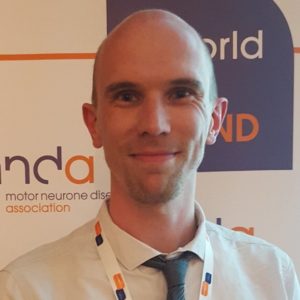Meet Dr. Russell McLaughlin, Funded Investigator in Trinity
Dr. Russell McLaughlin has just joined FutureNeuro as a Funded Investigator. We asked him a few questions about his work and what he will be bringing to the centre.

Tell us a bit about yourself
I am an Ussher Assistant Professor in Genome Analysis at Trinity College Dublin. I have been researching the genomics of motor neurone disease for over ten years. This includes work profiling the high resolution population genetics of Ireland and other populations, and involvement in numerous international genomics consortia
What will you be doing in FutureNeuro?
I will lead a project entitled The genetic pleiotropy of neurodegenerative mutations. This work aims to establish the role of known causes of neurodegeneration across a range of neurological diseases. Genetic pleiotropy (multiple different diseases being caused by the same genetic mutations) is a common feature in neurological diseases; in this project we will explore the contribution of a unique type of genetic mutation called a repeat expansion (known to cause motor neurone disease, spinocerebellar ataxias and other neurodegenerative diseases) to epilepsies and encephalopathies. This will help us to better understand the core biological mechanisms of brain diseases so that better diagnostic, predictive and preventative strategies may be developed.
How did you become interested in this type of research?
I have been researching the genomics of motor neurone disease (MND) for over ten years. During my career I witnessed the most significant genetic discovery in MND research to date: the contribution of a repeat expansion in the gene C9orf72 to the disease. This has changed our view of MND biology, but also more broadly, of neurological disease. While these discoveries were being made, I was contributing to work that has established the genetic overlap between neurological diseases, so the confluence of these two streams of research is a natural and logical progression. In my group we have also been developing cutting-edge methods to profile repeat expansions using genome sequence data; this project will apply these methods to new epilepsy and encephalopathy data to explore new avenues in these diseases.
What do you hope to achieve/ What will the benefit be for people with a neurological disease?
For many neurological diseases, the greatest obstacle to developing new therapies is our incomplete understanding of their root causes and underlying biological processes. For most, this begins with genetics and the variation between people with and without the disease. As the human genome is a very large search space, with many regions technically intractable to profile, the route from generating genetic data to understanding the cause of disease can be long and winding. This work will shortcut most of the search for causes of disease by tackling the problem armed with prior knowledge of causes of neurodegeneration and acknowledgement that these causes may play a role in other neurological diseases. If successful, this research will benefit people with neurological disease by creating knowledge that is fundamental to development of therapies and understanding familial risk.


